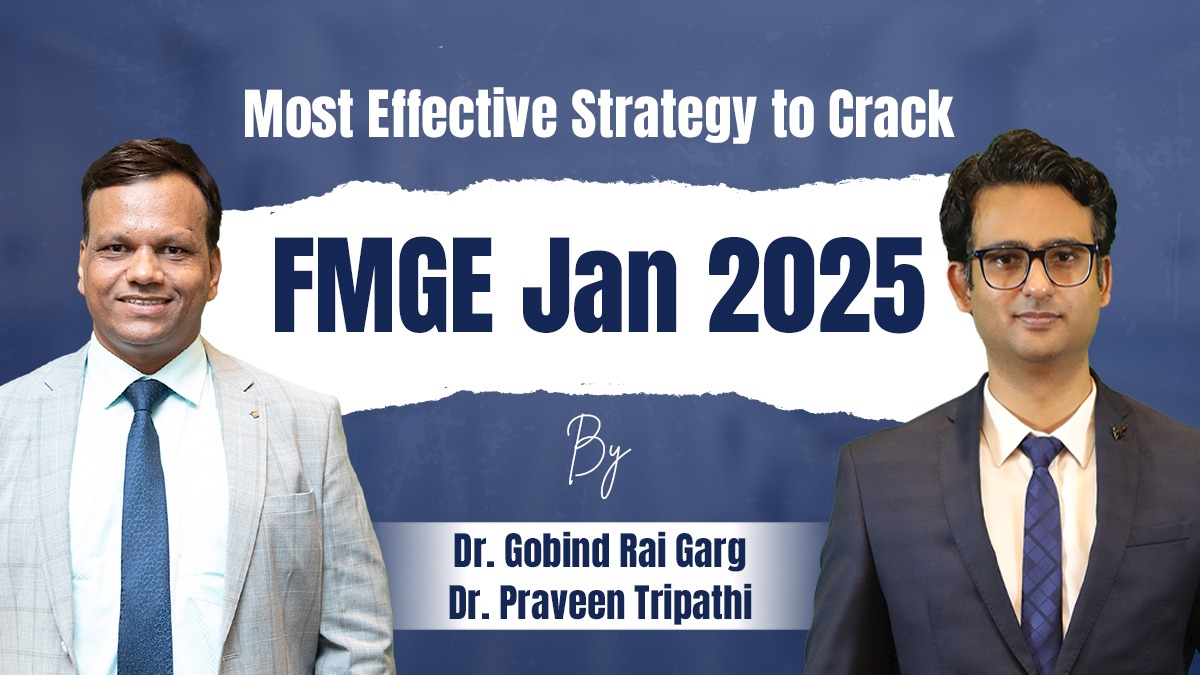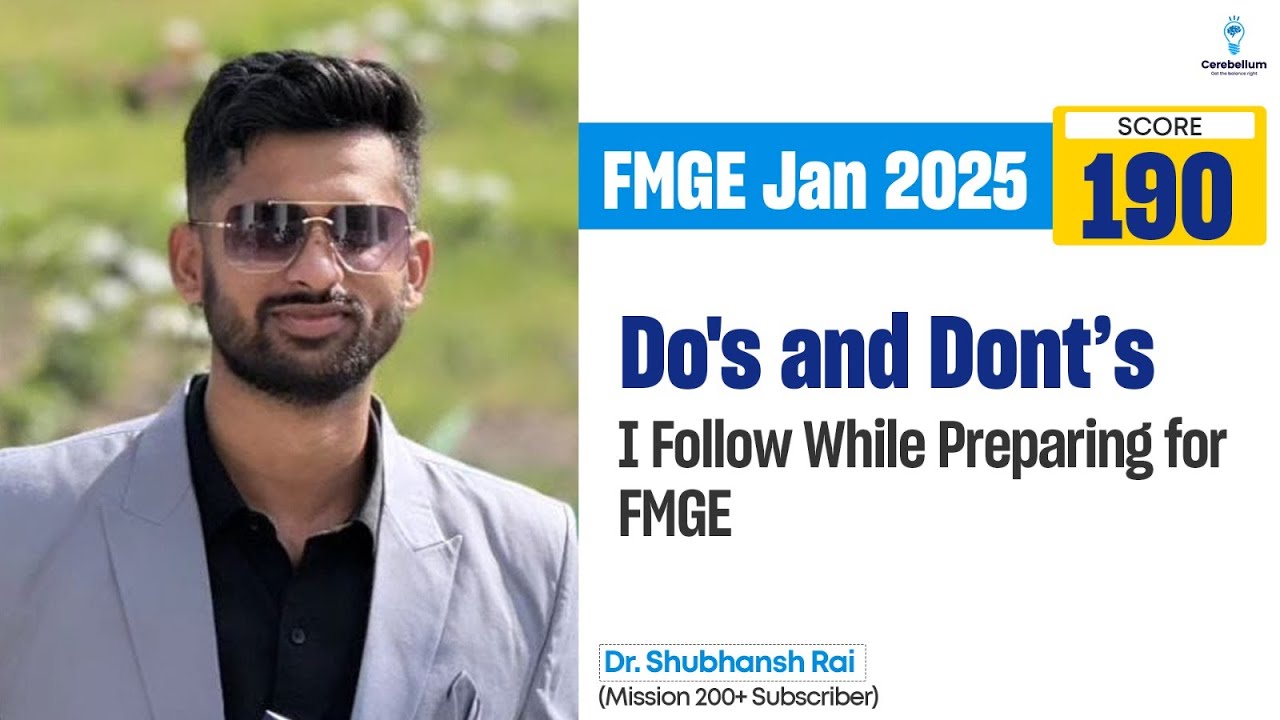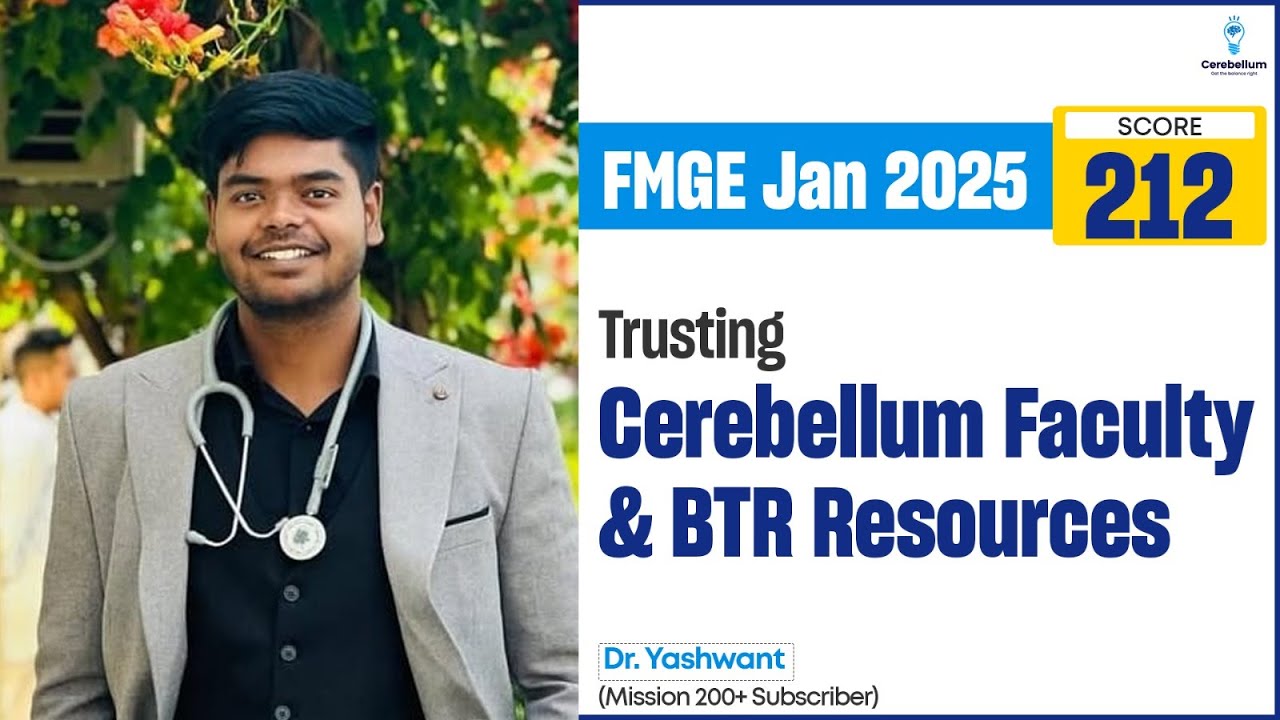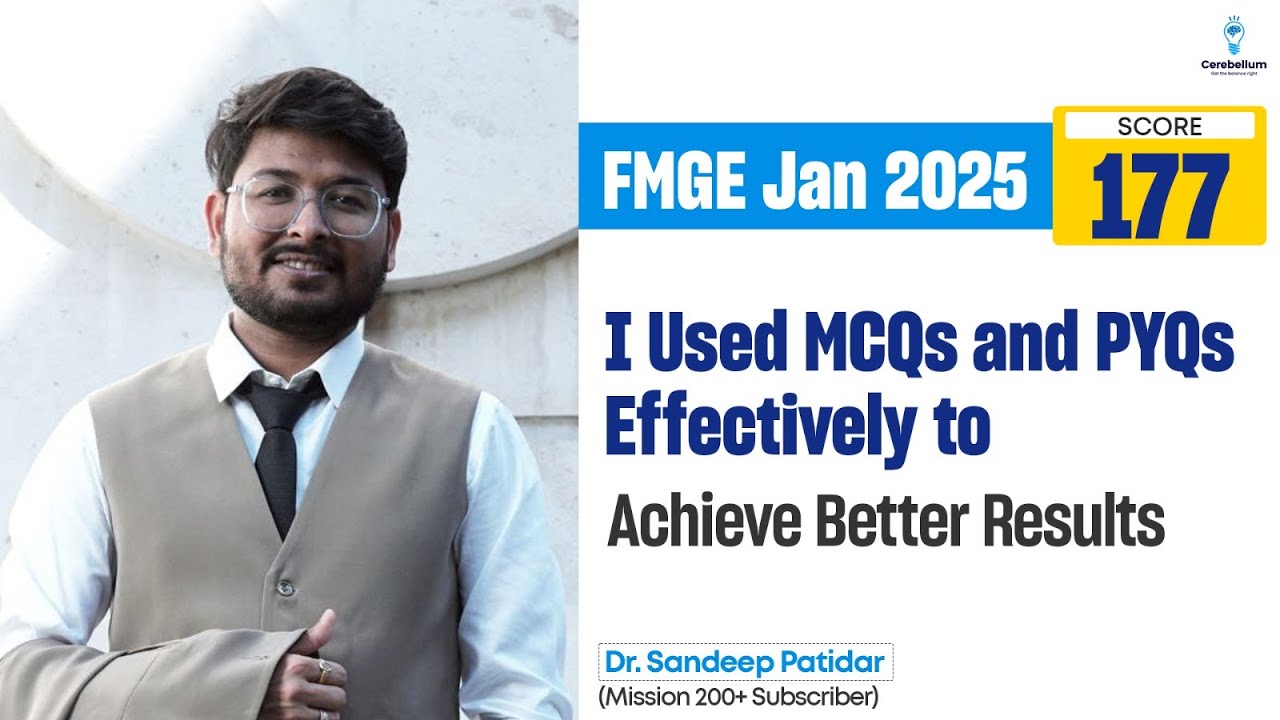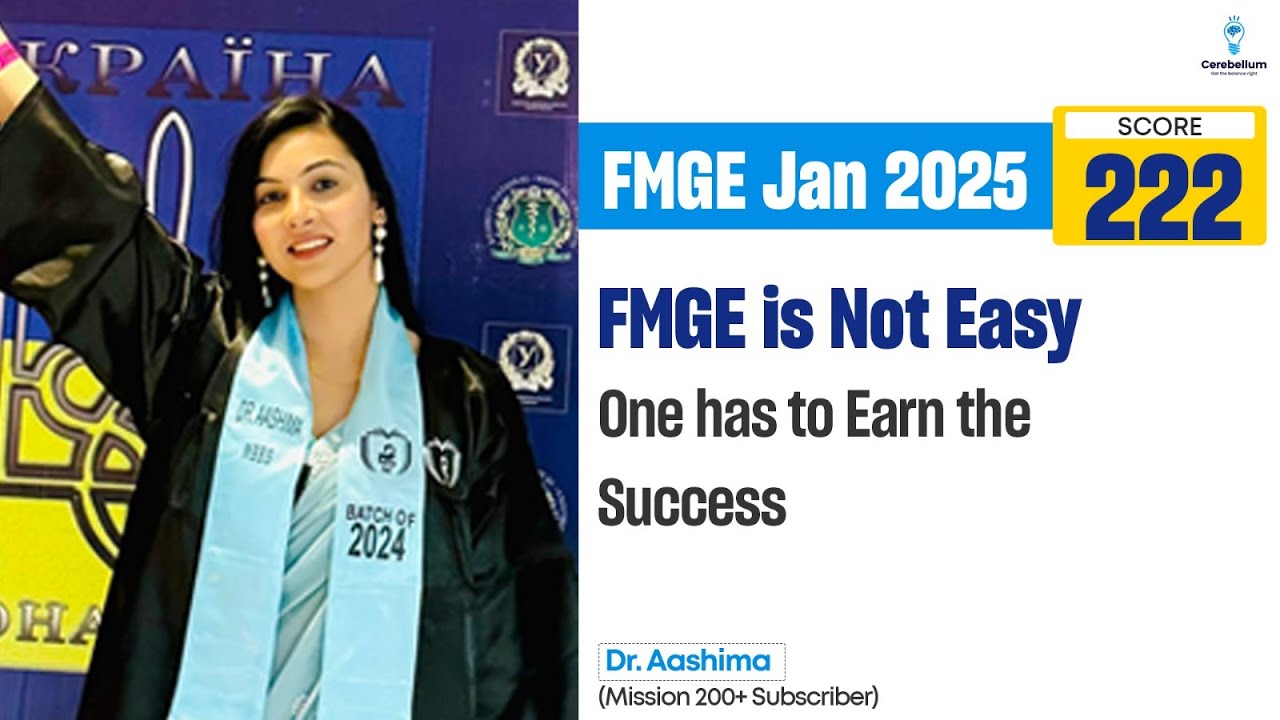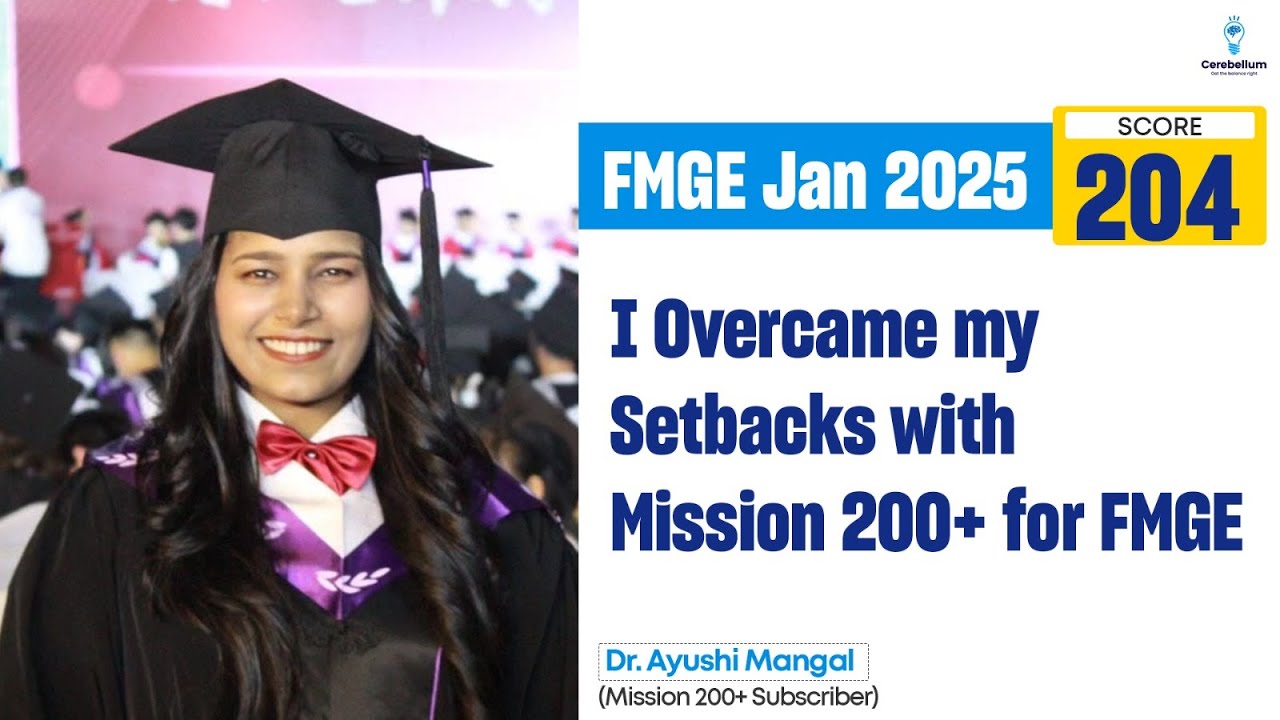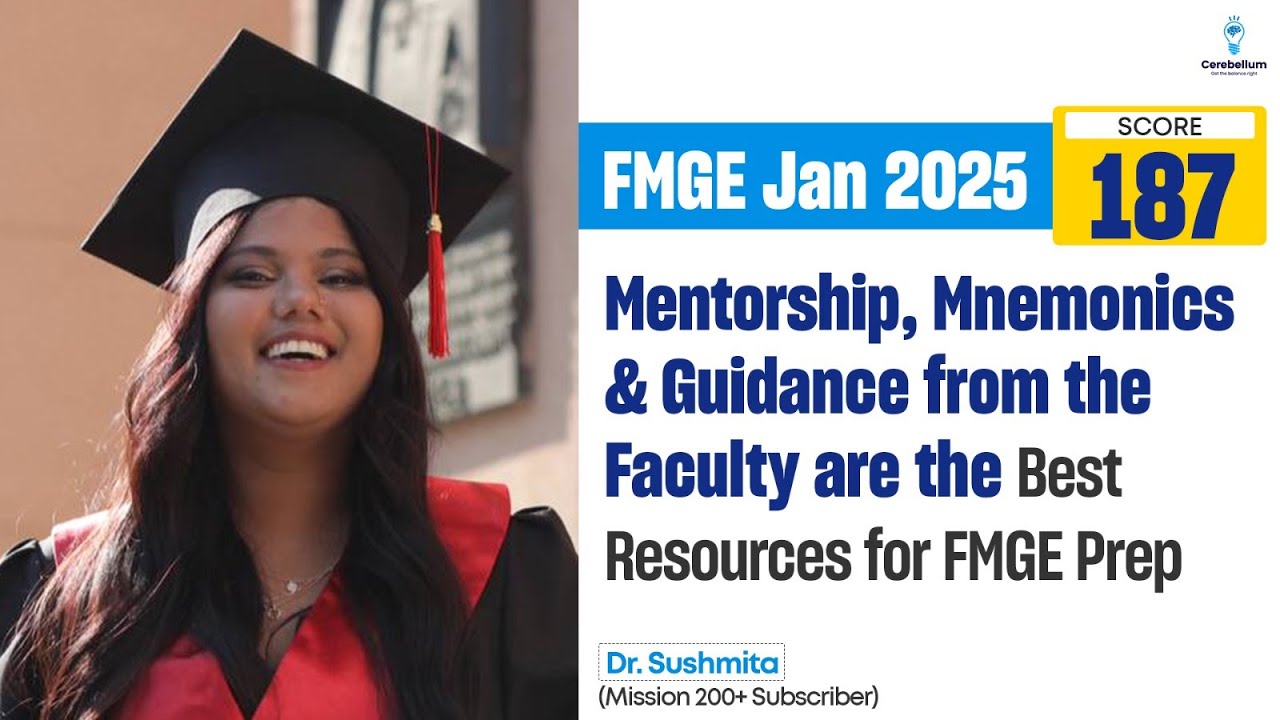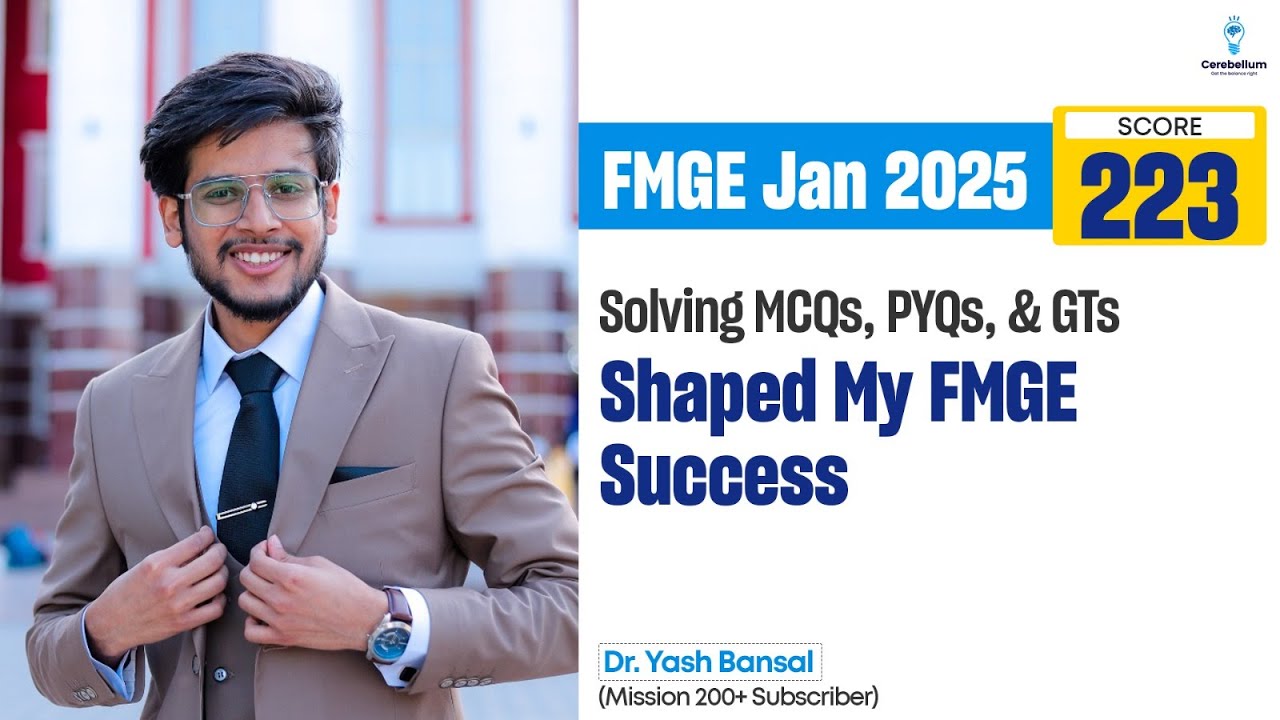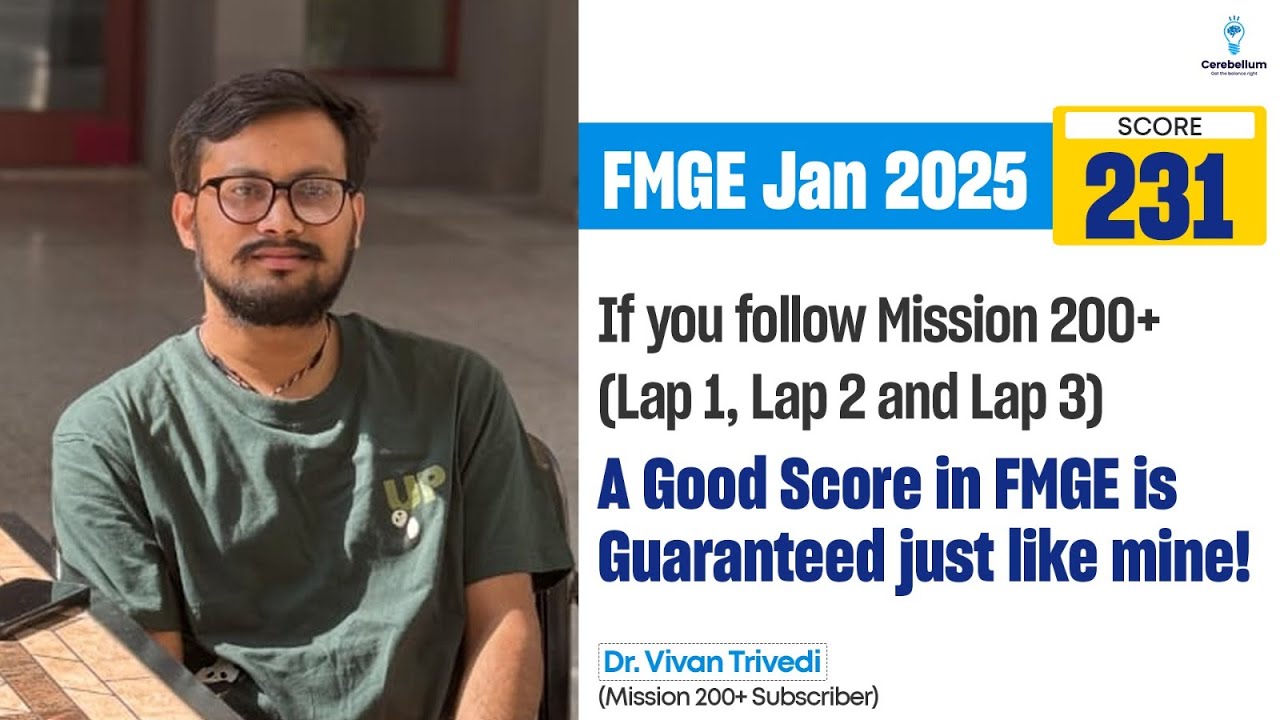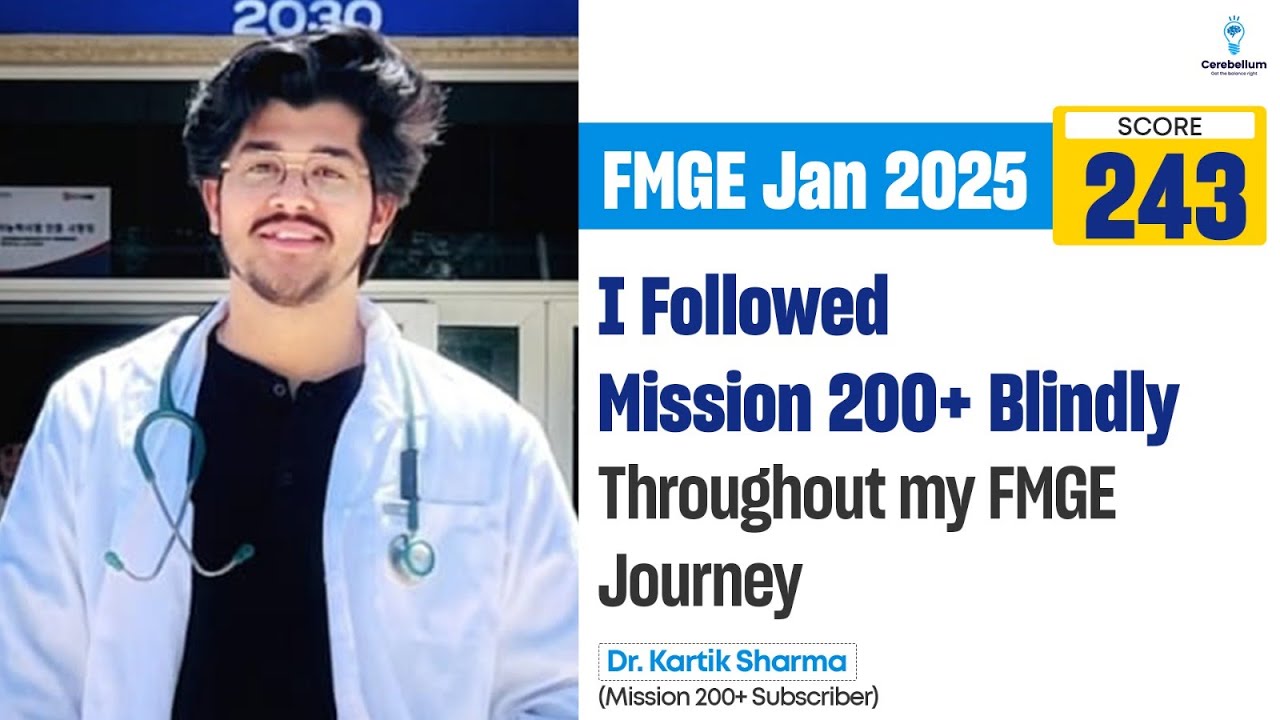Hello students, this is Dr. Praveen Tripathi and with me is the legendary faculty Dr. Gobind Rai Garg sir. So students, today we are going to discuss the strategy for the students who are going to appear for the Jan 25 FMG exam.
All of us know that the date of the exams was announced around a week ago. The exams are going to happen on the 12th of January. So, we have slightly more than two months, around 65-66 days, for the exam, and how to use these days effectively is the topic of this discussion.
So Gobind sir, the first and foremost thing is, that we are around 2 months, 7 days from the exam. Sir, there is a student who has not worked very hard in the first 4 months and who is getting serious now. Sir, is it still doable?
If a student is getting a score of 120-125 in the GTEs, is it still possible to take that leap and cross 150? Definitely, it is possible and I will say even if the student is getting around 100, even then it is possible. But the only important thing is, if the score is less than 120, then you need to work literally very hard and if it is above that, then good strategy and good time utilization will definitely let you pass.
So students, what Gobind sir is saying is something that all of us agree upon. In the last 2 months, what we see is you can increase your score by at least 40-50 marks.
So even if you are somebody who is struggling at 120-125 and if you use these 2 months properly, you can definitely touch 175, for sure cross 150. So it is doable, 100% doable, there is no question about it and we are not just saying this to motivate you. This is something that we have seen over the years. A lot of students start studying later but they study very hard and they cross the final line. So yes, it is doable. But this is what Goga sir meant when he said that you have to work very hard, you have to focus on the consolidation.
Goga sir, there are 2 types of students today. One of them is doing fairly okay, they are crossing 145, 155, 165. For them, as well as the students who are stuck around 120, I believe for both of them, consolidation is very important.
So sir, what do we really mean when we say that we have to consolidate in the last 2 months? So the most important thing is the syllabus for the FMG exam or for that matter, the PG Entrance exam, which is infinite. You cannot do everything. Even a topper cannot do everything.
So what is most important is that you need to know which topics are very important and those topics you cannot skip. Even if you have studied everything earlier and you have studied, you have revised also but this is the time when you need to consolidate that. So by consolidation, I mean all the important things which are required, that should be in one place and you should be able to revise them and reproduce them in the exam.
So by consolidation, sir, means that everything should be together and you should be able to revise and reproduce those things in the exam and that is why it is very important that you read all those things in the last days. They should remain fresh in your memory. Apart from that, when we start approaching the exam, this is the time when you have to accelerate.
This is the time when you have to take your preparation a couple of notches higher. So when Goga sir writes that increase the intensity of the preparation, this is what he means. Goga sir, can you please elaborate on that? So by intensity, I mean two things.
Number one, obviously the number of hours you give to studying, definitely should, has to be increased. If you were studying earlier, 6 hours, 8 hours, you have to cross 10 hours minimum. So this is one important thing, particularly for those students who are starting afresh or who have not worked very hard earlier.
For those who have already worked very hard and are going at good speed, 8 hours, and 10 hours are good enough for them. But if you are a little less skilled person, like you are in the 120s, then it has to be more than 10 hours, maybe 12 hours, 14 hours, whatever your capacity is. This is number one, study hours.
But second, the very important thing in intensity is the quality of study hours. So that is very important because many times I see the students keep on studying for 12 hours, or 14 hours, but effectively they are studying only for 5-6 hours. So this is very important.
You need to make the study hours effective. So one important method by which we can make that effective is just by simply switching off your phone. So this is a very, very effective method.
I have seen my results, and I have seen results with my son. So when he studies with the phone on, he says that I am just seeing one message in between. But the thought process which is going on gets broken.
And when he comes back to study, he has to see 4-5 lines previous and then he has to think again and then go again. So in one hour, if you have just seen three messages, you are 10 minutes behind. And plus the momentum goes away.
So this is very important. Number one, switch off your mobile, study for your session, maybe one and a half hours, two hours, two and a half hours, whatever your capacity is. After that, when you take a break of 15 minutes, or 20 minutes, now switch on the phone.
Now see the reel, whatever you want to do. So 15-20 minutes, you can do that. Again, switch off the phone and start studying.
So this is one point that you have to let go of distractions. So what Goga Sir is saying is actually scientifically backed.
When we start studying, it’s not that we reach that highest level of concentration immediately. It takes some time for you to reach that highest level of concentration. And if you’re watching a reel or if you’re seeing a message, it gets broken.
And then again, you have to start from the very beginning. So what he’s saying is scientifically backed and it’s a very important point. In fact, I’ll give you a formula, your duration of study or duration of let’s say effective study is the number of hours you spend with the book or the app or whatever it is into quality.
Now ask yourself after completing say an hour session, ask yourself on a scale of 0 to 1, what was the level of my intensity? Say you say that I was pointed, I was at 80% of my best. So in that case, say you studied for 10 hours, but if your intensity was only 0.8, you are effectively studying only for 8 hours. And if your intensity is 0.2, you are effectively studying for only 2 hours.
Most of the students focus on this number. They forget that this number is equally important. And that is what Goga Sir is saying when he talks about the intensity of the studies.
It’s a very important, very pertinent point. And you should ask yourself every now and then, what is the intensity of my study hours? Goga Sir, discipline, you have been talking about this from the very beginning that there are students who study for 12 hours on one day and for the next two days, they are studying for one hour or two hours. So what do you mean by discipline here? And what is our suggestion to the students as far as the discipline is concerned in these last two months? So this is very important.
If just like a Hare and the Tortoise story. So one person may be studying 12 hours a day, 14 hours a day. He studies for 3 days, 4 days, 10 days continuously, but then for the next 15 days is not studying.
So he is not a good student. I will not say, I will say his preparation is not that good. But if you are studying continuously, that leap means you are continuously, continuously, continuously studying daily.
So that is much more important. So yes, you need to increase the duration of your studies. But the important thing is that should be maintained.
And what is a very important thing in consistency is, I again and again say that even if it is only 65 days remaining, at least every week, keep 3-4 hours of break time. So every week, you already know that on Sunday evening, 6 to 10, I will not study. So if it was six months, I would say half a day.
But if it is two months, but minimum four-hour break should be there. But that should be a scheduled break. If you do not take a scheduled break, then your brain will take a break.
And that will be for a long time. So that is very important. So consistency is very important.
But to maintain consistency, you have to give your brain a break, which is a scheduled break. Right. So breaks are important.
Again, a very important point is that if we don’t give breaks to our brains, we’ll get saturated. And you may be sitting with the books open, but nothing is going inside. So that is what sir is talking about, give yourself a break for a couple of hours, even for a day.
If you feel you are very saturated, you can give it even for a day, that is okay. Students, this is something that I just want to elaborate upon. Many students start late, but then they accelerate their studies so well that they end up doing even better than the students who start early. Right. I mean, if we can take an analogy from cricket, many players would come very late in the inning, but they pace their innings so well that they end up scoring more runs. And this is that time. This is the time when you have to take things to the next level. So in these last two months, if you can pace your preparation well, you can get any result, my dear students. All right.
A couple of things that we always talk about, are MCQ practice, PYQs, and PYTs. Goga sir, a very interesting thing happened. In the Supreme Court, the NBE said that we cannot give the questions, we cannot out the questions because we have limited questions. And if we start giving them, we would run out of the questions. I think that is the NBE’s way of saying that PYQs and PYTs are extremely important. I also read that. And that immediately stuck in my mind also that NBE itself is saying that we have a limited number of questions and topics. So if we make them out, then from where we will give the questions? So indirectly, they are saying that 80 % and 90 per cent of questions will be from the same topics.
Goga sir has been saying this from day one, that 10 years back it was the same, 20 years back it was the same and 10 years from today also it would remain the same. In medical sciences, new topics cannot be created overnight. So PYQs and PYTs are going to remain the bedrock of preparation.
MCQ practice is important. Nowadays, Goga sir, we are seeing that even in the FMG exam, the questions are very twisted. So knowing is one thing, but the art of solving MCQ is another thing which is becoming equally important in the FMG exam as it was in say INI CET exam.
So MCQ practice, Goga sir, is as important. So basically, we keep on saying that there are three pillars for clearing any entrance exam. So the number one will be your knowledge, which is theoretical knowledge and factual knowledge.
Obviously, you should know the topic only then you can answer. And second very important is MCQ practice, because finally, the exam is MCQ. Even if you know the theory thoroughly, if you are not able to solve the MCQ, so then all will be a waste.
So you need to apply that theoretical knowledge for the MCQs which can be done only when you practice. So when you practice a lot of MCQ, you get a habit that if this type of question is asked, this type of thinking should be done. So that can be developed only after solving the MCQs. And third and most important is the grand test. So grand test, we discussed several times earlier also, the function of a grand test is not only to see your progress or score, that is the least important function. The most important function I will say is that it will tune your brain to sit continuously for three hours, three and a half hours and think.
If you first time start taking the exam, actually in the exam centre, you have never been given three three-hour exams and you go to the exam centre, sit for three hours, definitely, you will complete your exam. But after two hours, maybe two and a half hours, your brain will get tired. And then easy questions start getting wrong. And those questions you come outside and say silly mistakes away. So no mistake is a silly mistake is a mistake. So that is very important.
That is the major function of GTEs that your brain gets accustomed to sitting for long hours and thinking. Another thing that you keep telling students is that making mistakes in GTEs is actually good. So can you elaborate on that? So whenever you make any mistake in the grand test, so many times the students what they do, they start giving the grand test, they get very low marks, and then they stop giving that it is making me disappointed or I am not demotivated. But the problem is whatever questions you have made wrong, and you check why you were made wrong, then similar types of questions you will never make wrong in the actual exam. So this is very important because suppose out of the 200, you are making 80 mistakes or 100 mistakes. So those 100 mistakes you will not make in the actual exam.
So it is the actual exam that will matter, not the grand test. So do not afraid of getting the wrong answers in the GTEs. So please remember students, this is a golden line that makes mistakes in GTEs because you would not repeat the same mistakes in the actual exam, and the actual exam is what matters. So not only GTEs, I would say even the subject test that we regularly take from students, in those tests also if you make a mistake, you would not repeat that mistake in the actual exam. So it is very important to take those tests and see where you are getting things wrong and correct them. Alright, so these were some of the general points as far as the preparation is concerned.
Now let’s talk about our Cerebellum students and those who want to join Cerebellum. How are we going to take care of each and every point that we just talked about? So Mission 200 Plus is the program that we have only for FMG students. I mean, this is a program which is attended only by the FMG students, catered to the needs of FMG students. So we are about to start with the second lap of this Mission 200 plus because in comparison to the last batch, this batch we had slightly more time. So we have not let go of that time, I mean, we did not waste that time. What we have done this time is we have added a concise lecture part.
As you were saying in the end, we have to consolidate everything. So concise lecture is something where we will give a short duration of time, say for Pharma we will be giving say five hours or four and a half hours. But in those four and a half or five hours, Goga sir would be talking about all the things that are important and that are likely to be asked in the exam.
Similarly, for other subjects also, we have given lesser duration because we want it to be very concise. In the last two months, we want to put those things in your brain which are likely to be asked in the exam. So Goga sir will be having concise lectures.
Then this is something that is the USP of Cerebellum, subject-wise, E&Ds, live tests and discussion. So Goga sir, what would be the thought process of a teacher while he is setting up these E&Ds in the lab too? So basically, the advantage to you students in the last exam, exam was that lab two started just one month before the exam. So we did not have any extra time.
So this time the exam is in January. So we had made the schedule according to December earlier. So we have got one month extra. So we are utilizing that one month extra in giving the lectures on every subject. So every subject said earlier in the past last session exam, last batch exam. So we had given only E&Ds in Lap 2. Now we have added the lectures also. So there will be one lecture on a subject, and then there will be an exam and discussion. Now when a teacher is making an exam and discussion, one thing, all the questions which are likely to be asked in the exam, so very relevant topics, will be there.
And second, you will get the art of solving the questions which we were talking about earlier. So the teacher will pinpoint that here you can get the mistake. So that is the important thing.
So seriously attend these E&Ds and you will get greatly benefit from this. Along with that, this is again a new thing that Cerebellum had introduced and all of our students who got selected in the NEET-PG, INI-CET or FMG exam, spoke highly of this. So we’ll continue with the late-night PYQ marathons.
What does late night PYQ marathon for somebody who’s new to Cerebellum? So what we do is at the end of the day, say around 10.30 PM, when people are tired, we run an exam, a test. So now it would be around 40 to 50 questions, mixed bag questions, all the subject questions, all the PYQs from the FMG exam and some questions also from NEET-PG, which can be or may be asked in the FMG exam. So we give a test, it starts at 10.30 PM, you are given like 30 minutes or 40 minutes, all of them are PYQs and the purpose is or the aim is to make you well versed with the PYQs.
And why do we keep these late-night PYQ marathons? Why have we kept them at late night? Because that is the time when you are tired when you can do more passive stuff. So that is the perfect time to put that PYQ in your memory and give you a much important or very important practice for PYQ solving. So that would also be part of lab 2. GTs that simulate the exam. Because when Cerebellum makes a GT, what is the thought process? Because there are two conflicting thought processes. One is to make a GT very difficult and wow the student, wow what a GT it was. The second is to make a GT very relevant about things that are asked in the exam and are likely to be asked in the exam.
So what approach do we follow in Cerebellum? So obviously we follow the second approach. So I have been teaching for 20 years and whenever I give any test anywhere, so many of the students say that sir these are quite easy. And why don’t you make difficult papers like every institute? So I say that if you are able to solve these in the exam, you will be able to solve the same percentage marks, whatever you are getting here.
Because I am not of the opinion that we should ask new drugs or difficult topics which are less likely to be asked in the exam. So whichever are relevant and likely to be asked, even if they are easier. So you should be asking those only. So the thought process behind giving the GTs is to make exam exam-like papers. So if you are scoring well in these GTs, definitely you will score well in the actual exam also. As teachers, we know that the things that impress you as a student are often not the same things that will help you as a student.
And we have always chosen to go with the second thing because we aim to help you pass the exam, not to impress you. And that has been our strategy and that will remain our strategy. Of course, access to the recorded content will continue. The reason is that say there is a subtopic, say in surgery, say in GIT, you are getting all the questions wrong and you want to read the topic in detail. Then you have access to the content, whether you want to go with the main lectures or the quick revision videos, whether you want to see the English lectures, English lectures, all of that would also be a part of it. So I would like to add here.
So this is one of the very important things you need to concentrate on because whenever you take any subject-wise test or GIT, there will be some questions which you will be making wrong, particularly from the important topics which are likely to be asked. And in every GIT, you are making that mistake. So if you are making mistakes in different GITs on the same topic, then I will advise that see that topic from the main videos. And if you are Hindi Hindi-speaking person, see the English videos. They are very, very good. So just see that topic, and shy away from correcting your mistakes. Do not think that you are wasting time. So I’m not saying that see 20 hours of videos, see just half an hour, one hour of that particular topic. So that will benefit you immensely. For that particular topic that you’re getting wrong repeatedly, probably your concepts are not good and there’s nothing wrong in watching the main videos for that topic.
Q-bank, we have got a good clinical Q-bank, but at this point in time, when you’re two months away from the exam, PYQs, and PYTs are perhaps more important than going through the entire Q-bank. So I will add on here. So late-night PYQ marathons you are already doing and the rest of the time, do not always keep on selecting the PYTs or PYQs only. Please make the custom modules and select other topics also, not only the previous questions because that anyways will be covered in the late-night marathon. So you have to add some topics, at least some questions from the other, not PYQs.
So Goga sir recommended that you do a custom module of 50 questions. In the night, you will cover 50 PYQs. In the morning, you do 50 custom module questions. So you have covered 100 PYQs, which is a very good number. Goga sir, another USP of Cerebellum is its famous marathon. So we’ll be having a marathon FMG right before the exam.
So what is this FMG marathon and why have you created a separate marathon for FMG, unlike other institutes which can club everything together? So what is it and what is the reason behind curating a completely new course? So basically, the marathon as the name tells that it is the last huge race. So you have to run 42 kilometres now. So that time is less.
So the last 10 days, daily for around 12 hours, the teacher will be sitting in front of you and completing the entire syllabus in these 10 days. The entire 19 subjects complete the syllabus in these 10 days. So this is the number one thing, everything will be covered.
Number two, why it is different? Because we know although the syllabus is the same for FMG, NEET also INICET, but we have created separate marathons for all three because there are some topics which are favorites of the examiner for that particular exam. Like in FMG, some topics will be more likely to be asked as compared to those that are asked in the NEET or INICET. So the marathons will cover all those relevant topics.
So that’s why we have made separately for every exam because the requirement of every exam is a little bit different. So we are trying to cater to that. So, students, the whole idea of a marathon is that in the last 10-11 days, it is very commonly said that the biggest challenge is to cover everything together in the last days. And I think 99% of the students struggle with that. So we said that, okay, let us take the responsibility. And that gave birth to the concept of marathon FMG, that in the last 10 days, we cover everything.
But as Goga sir said, these are long days, 10 to 12 hours per day, spanning for 7 to 8 days. So you will be taught a lot. And it will be challenging for you to sit through all those sessions.
But all our students who cracked the exams, after they got good ranks and when we were interviewing them, almost all of them said that these marathon sessions helped them a lot. So they are a goldmine of information. They are very high-yield and use them. Teachers are putting a lot of effort into giving you everything consolidated. Use it as much as you can. All right. So I’m just showing you the schedule details. So we are starting from 5th of November. Some of you might be watching this video on the 5th or on the 6th.
- So we will be starting from 5th. Biochemistry by Dr. Ankur. So he’ll be teaching on the 5th of November.
- 6th of November, there will be a test and discussion. So in the morning time, you revise your subject. In the evening, you attend the class and cover the important topics. Again, on the 6th in the morning, you revise. And in the evening, you have a test and discussion. Then we are giving breaks.
- On the 7th, there’s a break.
- On the 8th, we start with physiology. Again, break.
So so on and so forth. For shorter subjects, we have club 2 subjects on the same day also. So this is how it will proceed. There are a lot of break days in between for the self-study. And anyway, in the morning hours, you are supposed to do the self-studies. There will be GTs in between, roughly 2 GTs per month.
And this entire thing would end around the 31st of December. Our exam is on the 12th of January. So in the last, in the first week of January, we’ll be having the marathon sessions.
As you can see on 2nd Jan, we’ll have 3 subjects, 3rd Jan. So in the similar fashion, we would cover everything. So it’s a very jam-packed schedule.It’s a very high-yield schedule. It’s a schedule that ensures that along with your self-studies, we are there with you on every step of the preparation. And we are continuing with you till 9th of January.
We are leaving you on the 10th and 11th so that you can relax and prepare for the exam. All right, some important questions, Goga sir. Say somebody is doing the marathon session.
Would you be providing some notes, and some PDFs? Yes, whatever teacher is teaching in the marathon, that PDF will be available to you, an unannotated PDF? So you can add on the thing, whatever that teacher is teaching extra. A little bit extra you need to add.
So that will help you in active learning.
So the class timings would remain the same. We would usually start at 5 p.m. But in marathons, we have classes the entire day.
What if you miss a class? As you know, as Cerebellum students know, every session is recorded. And if you miss something, you can watch the recorded version the next day. But Goga sir says this thing every single time that does not miss a class. The whole point of doing all these classes live is to bring discipline. If you start thinking that, OK, I’ll do it tomorrow, the tomorrow never comes. So don’t fall for procrastination.
Do the class along with the teacher. That is the best way of keeping yourself, you know, staying in the schedule, following the schedule as it is meant to be. If you are preparing from another source, Goga sir, what is our suggestion? My suggestion is if you are confident that you can revise from your source, then do not change, continue with the same. But if you are frightened that I have studied so much, how I will consolidate it, how I will revise that, then we will definitely advise come here. So we will take care of that. And what you can also do is mix and match.
Say for some subjects you are very confident, you revise from the original source. For other subjects where you are not so confident, follow whatever is being done in the Cerebellum. How to enroll? So for the students of Cerebellum who are already a part of Mission 200 plus, you don’t have to do anything. All of this is a part of your subscription. If you are a new student who has not joined Cerebellum till now but wants to join Cerebellum at this stage, you can go to the website www.cerebellumacademy.com, the name of the platform. Look at the plans, go for mission 200 plus.
And now we have a three-month subscription also for the students who want to join late. I think the price is somewhere around 18k. And you can always add the coupon code of Cerebellum, which will give you a Rs.1000 discount. So you can do that. And you can become a part of this. So just to summarize, we are moving towards the second and the more important phase of the preparation, where we will be consolidating everything together.
We’ll have concise lectures followed by tests and discussions. There will be late-night PYQ marathons. There will be grand tests.
Finally, in the last 10 days, we’ll have a marathon session where we’ll put everything together so that you remain fresh with all the important content as you go for the exam. So my last word will be to talk to your seniors who have cleared the exam this time. And they will tell you that the most important motivation for clearing this exam will be to attend the Felicitation Ceremony. So that will be a huge fun. So we will be seeing you on the Felicitation Day. And I hope most of you will be able to join if you keep on studying.
I will end this video by saying the same things that I said at the beginning of the video. 70 days and 65 days are not a lot, but they are good enough to crack the exam. If you say today that I’m going to utilize every single moment when I’m awake, you would definitely pass the exam. Study hard, study very hard, study so hard that you end up surprising even yourself. You know, when you go to bed, this thought should come to your mind. I studied for 12 hours.
I never knew I could study for 12 hours. And you know that feeling of satisfaction that you carry with you when you go to bed after utilizing a day, it’s magnificent, it’s magical. Get used to that feeling, study hard, make yourself proud, make your parents proud and make your teachers proud.
We’ll meet you on the day of Felicitation. All the best.

